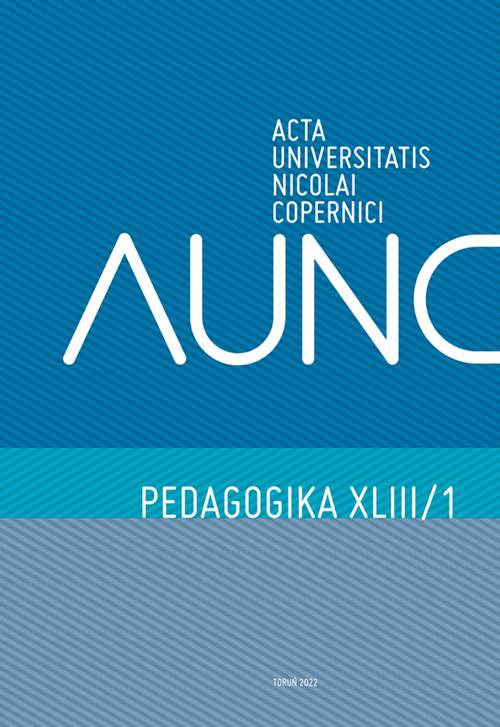Migracja i związane z nią potrzeby wsparcia adolescentów i młodych dorosłych
DOI:
https://doi.org/10.12775/AUNC_PED.2022.004Słowa kluczowe
migracja, wsparcie, sieć społeczna, pomoc kulturowo wrażliwa, aktywizacjaAbstrakt
Migracje stanowią jedno z bardziej powszechnych zjawisk charakterystycznych dla globalnej ponowoczesności. Ze względu na swoje wieloaspektowe (społeczne, kulturowe, ekonomiczne, polityczne) ulokowanie zjawisko to wymaga podejmowania studiów interdyscyplinarnych. Z problematyką migracji łączą się specyficzne problemy, które rodzą potrzebę podejmowania działań o charakterze wsparcia. Jego potencjalnym odbiorcą są podmioty o różnym statusie (zarówno sam migrant i jego rodzina, jak i środowisko społeczno--kulturowe, w którym jest ulokowany). Przedmiotem analizy są potrzeby oraz praktyki wsparcia związanego z sytuacją migracji. Uwzględniając opublikowane dotychczas dane, głównie z obszaru Europy Zachodniej i USA, przedstawiono specyfikę doświadczeń migracyjnych adolescentów i młodych dorosłych, wskazano na związane z nią specyficzne i niespecyficzne potrzeby oraz stanowiące odpowiedź na nie strategie wsparcia realizowanego w środowiskach lokalnych.
Bibliografia
Asylum in Europe. Statistics Poland, https://asylumineurope.org/reports/country/Poland/statistics/ (dostęp: 11.01.2022).
Balicki, Janusz, Peter Stalker. Polityka imigracyjna i azylowa. Wyzwania i dylematy. Warszawa: Wydawnictwo UKSW, 2006.
Blackwell, Dick. Counselling and Psychotherapy with Refugees. London–Philadelphia: Jessica Kingsley Publishers, 1988.
Borgonovi, Francesca, Artur Pokropek. 2019. „Education and Attitudes Toward Migration in a cross country perspective”. Frontiers in Psychology 10: 1–17. https://doi.org/10.3389/fpsyg.2019.02224.
CBOS. Opinia publiczna wobec uchodźców i sytuacji migrantów na granicy z Białorusią. Warszawa 2021.
Celik, Filiz, Tom Cheesman. 2018. „Non-professional interpreters in counselling for asylum seeking and refugee women”. Torture 28(2): 85–98. https://doi.org/10.7146/torture.v28i2.106809.
Child and young migrants. Migration Data Portal. https://www.migrationdataportal. org/themes/child-and-young-migrants (dostęp: 11.01.2022).
Derewienko, Emilia. Ilu uchodźców z Ukrainy jest w Polsce?. https://300gospodarka. pl/news/uchodzcy-z-ukrainy-w-polsce-liczba (dostęp: 1.06.2022).
Dietrich, Hans, Radwan Al Ali, Sefik Tagay, Johannes Hebebrand, Volker Reissner.2019. „Screening for posttraumatic stress disorder in young adult refugees from Syria and Iraq”. Comprehensive Psychiatry 90: 73–81. https://doi.org/10.1016/j.comppsych.2018.11.001.
Duman, Nurdan, Yaser Snoubar. 2017. „Role of Social Work in the Integrating Refugee and Immigrant Children into Turkish Schools”. European Journal of Social Sciences, Education and Research 4(4): 326–336. https://doi.org/10.26417/ejser.v10i2.p294-294.
Fazel, Mina, Jeremy Wheeler, John Danesh. 2005. „Prevalence of Serious Mental Disorder in 7000 Refugees Resettled in Western Countries: A Systematic Review”. Lancet 365: 1309–1314. https://doi.org/10.1016/S0140-6736(05)61027-6.
Gottlieb, Benjamin H. 1985. „Social Networks and Social Support: An Overview of Research, Practice and Policy Implications”. Health Education Quarterly 12(1): 5–22. https://doi.org/10.1177/109019818501200102.
Hasanović, Mevludin, Izet Palević, Slobodan Pavlović. 2017. „The Acculturation and Repatriation Problems and School Behavioral Problems Reported from Teachers among Repatriated Refugee Adolescents in Bosnia-Hercegovina”.Trauma and Emergency Care 2(3): 1–9. https://doi.org/10.15761/TEC.1000129.
Heaney, Catherine A., Barbara A. Israel. „Social Networks and Social Support”. W: Health, Behavior and Health Education. Theory, Research and Practice, red. Karen Glanz, Barbara K. Rimer, K. Viswanath, 189–210. San Francisco: A Wiley Imprint, 2008.
Kim, Heejung S., David K. Sherman, Shelley E. Taylor. 2008. „Culture and Social Support”. American Psychologist 63(6): 518–526. https://doi.org/10.1037/0003-066X.
King, Russel. Theories and Typologies of migration: an overview and a primer. Malmö: Malmö Institute for Studies of Migration, Diversity and Welfare, 2013.
Knipscheer, Jeroen W., Marieke Sleijpen, Trudy Mooren, F. Jackie June ter Heide, Niels Van der Aa. 2015. „Trauma exposure and refugee status as predictors of mental health outcomes in treatment-seeking refugees”. BJ Psych Bulletin 39(4): 178–182. https://doi.org/10.1192/pb.bp.114.047951.
Kształcenie cudzoziemców na polskich uczelniach. Najwyższa Izba Kontroli 2020.
Michael, Suzanne. 2009. „Continuities and Discontinuities. Patterns of Migration, Adolescent Immigrant Girls and Their Family Relationships”. Qualitative Social Work 8(2): 229–247. https://doi.org/10.1177/1473325009103378.
Migracje.gov.pl. https://migracje.gov.pl/statystyki/zakres/polska/typ/dokumenty/widok/tabele/rok/2022/ (dostęp 11.01.2022).
Morina, Naser, Vita Sulaj, Ulrich Schnyder, Richard Klaghofer, Julia Müller, Chantal Martin-Sölch, Michael Rufer. 2016. „Obsessive-Compulsive and Posttraumatic Stress Symptoms Among Civilian Survivors of War”. BMC Psychiatry 16: 1–8. https://doi.org/10.1186/s12888-016-0822-9.
Moyce, Sally C., Marc Schenker. 2018. „Migrant workers and their occupational health and safety”. Annual Review of Public Health 39: 352–365. https://doi.org/10.1146/annurev-publhealth-040617-013714.
Mudadi-Billings Sheila, Patricia Eschoe. „On being an asylum-seeker”. W: The Handbook of Transcultural Counselling and Psychotherapy, red. Colin Lago,196–208. New York: Open University Press, 2011.
Plooy, Daniel R. du, Anthony Lyons, , Emiko S. Kashima. 2019. „The Effect of Social Support on Psychological Flourishing and Distress Among Migrants in Australia”. Journal of Immigrant and Minority Health 21(2): 278–289.
https://doi.org/10.1007/s10903-018-0745-2.
Ryan, Louise, Rosemary Sales, Mary Tilki, Bernadetta Siara. 2008. „Social Networks, Social Support and Social Capital: The Experience of Recent Polish Migrants in London”. Sociology 42(4): 672–690. https://doi.org/10.1177/0038038508091622.
Saint Arnault, Denise. 2009. „Cultural Determinants of Help Seeking: A Model for Research and Practice”. Research and Theory for Nursing Practice 23(4): 259–278. https://doi.org/10.1891/1541-6577.23.4.259.
Simich Laura, Morton Beiser, Miriam Stewart, Edward Mwakarimba. 2005. „Providing Social Support for Immigrants and Refugees in Canada: Challenges and Directions”. Journal of Immigrant Health 7(4): 259–268. https://doi.org/10.1007/s10903-005-5123-1.
Vojvoda Dolores, Stevan M. Weine, Thomas McGlashan, Daniel F. Becker, Steven M. Southwick. 2008. „Posttraumatic Stress Disorder in Bosnian Refugees 3½ Years After Resettlement”. Journal of Rehabilitation Research and Development 45(3): 421–426. https://doi.org/10.1682/jrrd.2007.06.0083.
Volkan, Vamik D. Immigrants and Refugees. Trauma, Perennial Mourning, Prejudice and Border Psychology. London: Karnac, 2017.
The World Migration Report. https://worldmigrationreport.iom.int/wmr--2020-interactive/ (dostęp: 30.11.2021).
World Migration Report 2020, Geneva, International Organization for Migration. https://publications.iom.int/system/files/pdf/wmr_2020.pdf.
Wyszynski, Mia Caroline, Rita Guerra, Kinga Bierwiaczonek. 2020. „Good refugees, bad migrants? Intergroup helping orientations toward refugees, migrants, and economic migrants in Germany”. Journal of Applied Social Psychology 50(10): 607–618. https://doi.org/10.1111/jasp.12699.
Zezwolenia na pracę cudzoziemców w Polsce w 2020 r. Główny Urząd Statystyczny, 20.05.2021.
Pobrania
Opublikowane
Jak cytować
Numer
Dział
Licencja

Utwór dostępny jest na licencji Creative Commons Uznanie autorstwa – Bez utworów zależnych 4.0 Międzynarodowe.
Statystyki
Liczba wyświetleń i pobrań: 558
Liczba cytowań: 0



